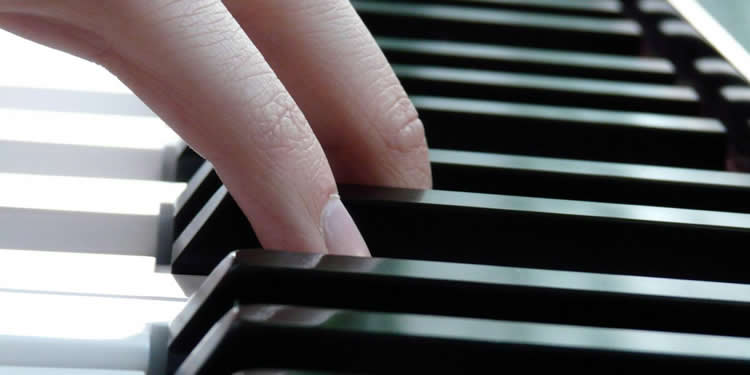Summary: People with musical anhedonia have reduced connectivity between brain areas associated with reward and sound processing, a new study reports.
Source: McGill University.
Have you ever met someone who just wasn’t into music? They may have a condition called specific musical anhedonia, which affects three-to-five per cent of the population.
Researchers at the University of Barcelona and the Montreal Neurological Institute and Hospital of McGill University have discovered that people with this condition showed reduced functional connectivity between cortical regions responsible for processing sound and subcortical regions related to reward.
To understand the origins of specific musical anhedonia, researchers recruited 45 healthy participants who completed a questionnaire measuring their level of sensitivity to music and divided them into three groups of sensitivity based on their responses. The test subjects then listened to music excerpts inside an fMRI machine while providing pleasure ratings in real-time. To control for their brain response to other reward types, participants also played a monetary gambling task in which they could win or lose real money.
Using the fMRI data, the researchers found that while listening to music, specific musical anhedonics presented a reduction in the activity of the nucleus accumbens, a key subcortical structure of the reward network. The reduction was not related to a general improper functioning of the nucleus accumbens itself, since this region was activated when they won money in the gambling task.
Specific musical anhedonics, however, did show reduced functional connectivity between cortical regions associated with auditory processing and the nucleus accumbens. In contrast, individuals with high sensitivity to music showed enhanced connectivity.
The fact that subjects could be insensible to music while still responsive to another stimulus like money suggests different pathways to reward for different stimuli. This finding may pave the way for the detailed study of the neural substrates underlying other domain-specific anhedonias and, from an evolutionary perspective, help us to understand how music acquired reward value.

Lack of brain connectivity has been shown to be responsible for other deficits in cognitive ability. Studies of children with autism spectrum disorder, for example, have shown that their inability to experience the human voice as pleasurable may be explained by a reduced coupling between the bilateral posterior superior temporal sulcus and distributed nodes of the reward system, including the nucleus accumbens. This latest research reinforces the importance of neural connectivity in the reward response of human beings.
“These findings not only help us to understand individual variability in the way the reward system functions, but also can be applied to the development of therapies for treatment of reward-related disorders, including apathy, depression, and addiction,” says Robert Zatorre, an MNI neuroscientist and one of the paper’s co-authors.
Funding: This study was published in the journal Proceedings of the National Academy of Sciences on Sept. 27, 2016. It was made possible with funds from the Governments of Spain and Catalonia, and from the Canadian Institutes of Health Research.
Source: Shawn Hayward – McGill University
Image Source: NeuroscienceNews.com image is credited to Hans Braxmeier.
Original Research: Abstract for “Neural correlates of specific musical anhedonia” by Noelia Martínez-Molina, Ernest Mas-Herrero, Antoni Rodríguez-Fornells, Robert J. Zatorre, and Josep Marco-Pallarés in PNAS. Published online September 27 2016 doi:10.1073/pnas.1611211113
[cbtabs][cbtab title=”MLA”]McGill University “Not Feeling the Music? Lack of Joy From Music Linked to Brain Disconnection.” NeuroscienceNews. NeuroscienceNews, 40 January 2017.
<https://neurosciencenews.com/music-brain-disconnection-5855/>.[/cbtab][cbtab title=”APA”]McGill University (2017, January 40). Not Feeling the Music? Lack of Joy From Music Linked to Brain Disconnection. NeuroscienceNew. Retrieved January 40, 2017 from https://neurosciencenews.com/music-brain-disconnection-5855/[/cbtab][cbtab title=”Chicago”]McGill University “Not Feeling the Music? Lack of Joy From Music Linked to Brain Disconnection.” https://neurosciencenews.com/music-brain-disconnection-5855/ (accessed January 40, 2017).[/cbtab][/cbtabs]
Abstract
Neural correlates of specific musical anhedonia
Although music is ubiquitous in human societies, there are some people for whom music holds no reward value despite normal perceptual ability and preserved reward-related responses in other domains. The study of these individuals with specific musical anhedonia may be crucial to understand better the neural correlates underlying musical reward. Previous neuroimaging studies have shown that musically induced pleasure may arise from the interaction between auditory cortical networks and mesolimbic reward networks. If such interaction is critical for music-induced pleasure to emerge, then those individuals who do not experience it should show alterations in the cortical-mesolimbic response. In the current study, we addressed this question using fMRI in three groups of 15 participants, each with different sensitivity to music reward. We demonstrate that the music anhedonic participants showed selective reduction of activity for music in the nucleus accumbens (NAcc), but normal activation levels for a monetary gambling task. Furthermore, this group also exhibited decreased functional connectivity between the right auditory cortex and ventral striatum (including the NAcc). In contrast, individuals with greater than average response to music showed enhanced connectivity between these structures. Thus, our results suggest that specific musical anhedonia may be associated with a reduction in the interplay between the auditory cortex and the subcortical reward network, indicating a pivotal role of this interaction for the enjoyment of music.
“Neural correlates of specific musical anhedonia” by Noelia Martínez-Molina, Ernest Mas-Herrero, Antoni Rodríguez-Fornells, Robert J. Zatorre, and Josep Marco-Pallarés in PNAS. Published online September 27 2016 doi:10.1073/pnas.1611211113






